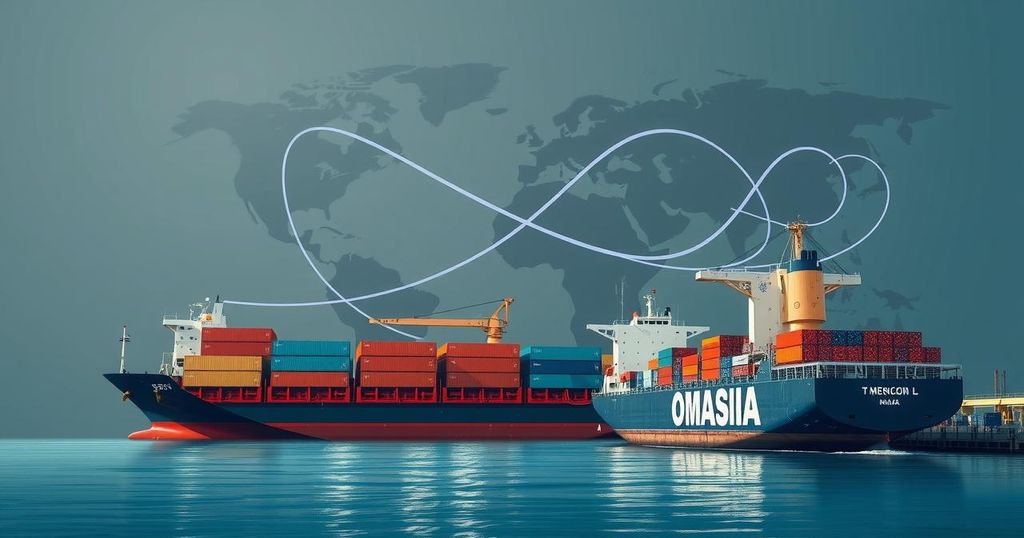President Trump’s tariffs have prompted significant retaliation from Canada, Mexico, and China, each arguing their positions while also preparing countermeasures. Canada and Mexico have enacted reciprocal tariffs on U.S. goods, whereas China plans to challenge the U.S. at the WTO, indicating a complex trade landscape ahead that may impact both economy and diplomacy.
In response to President Trump’s newly imposed tariffs, Canada, China, and Mexico have taken significant actions reflecting their discontent. Trump implemented a 10% tariff on Chinese goods and a 25% levy on imports from Canada and Mexico, justified under the International Emergency Economic Powers Act (IEEPA), citing issues of illegal immigration and drug trafficking as the primary motivations. The tariffs aim to mitigate these concerns while also fulfilling Trump’s longstanding commitment to impose tariffs, a concept he holds in high regard.
Canada’s Prime Minister, Justin Trudeau, announced that Ottawa would impose reciprocal tariffs amounting to 25% on $155 billion worth of U.S. imports, including American beverages and various consumer goods. Trudeau criticized President Trump, expressing disbelief over jeopardizing the historically strong U.S.-Canada partnership, noting the daily value of goods exchanged between the two countries. He stated, “The actions taken today by the White House split us apart instead of bringing us together.”
Mexico’s reaction came from President Claudia Sheinbaum, who also ordered retaliatory tariffs on U.S. goods. She indicated a preference for dialogue but emphasized the necessity of defending Mexico’s interests in the face of U.S. tariffs. The Mexican government is exploring a range of tariffs from 5% to 20% on various American products, particularly in the agricultural sector, while the auto industry will initially be excluded from these measures. Economy Minister Marcelo Ebrard condemned the tariffs, labeling them a “flagrant violation” of the US-Mexico-Canada Agreement.
China has denounced the tariffs and announced its intention to file a complaint with the World Trade Organization (WTO) while reinforcing its openness to bilateral discussions to avert further trade conflict. Chinese officials characterized Trump’s accusations about fentanyl trafficking as ineffective, asserting that these issues relate to the U.S. More moderately than Canada and Mexico, China’s response marks a deviation from the heightened tensions seen during earlier confrontations with the U.S.
Historically, U.S. administrations have similarly utilized tariffs as a tool during trade disputes, with Richard Nixon’s actions being the closest precedent to Trump’s tactics. Experts have expressed concerns regarding the potential negative implications of these tariffs, predicting a slowdown in economic growth and an increase in inflation across all affected countries. This apprehension leads to a shared sentiment that Trump’s approach may prove detrimental in the long term, as indicated by economic analysts.
The recent imposition of tariffs by U.S. President Donald Trump marks a significant escalation in trade tensions between the United States and its major trading partners, Canada, Mexico, and China. The tariffs, set at 10% for imports from China and 25% for those from Canada and Mexico, have been described as retaliatory measures under the guise of national security and economic protectionism. Trump’s administration claims the tariffs are necessary to address illegal immigration and drug trafficking, which they allege these countries have not adequately curbed. This situation highlights the broader implications of trade policies on international relations and economic stability across borders.
In conclusion, the responses from Canada, China, and Mexico to Trump’s tariffs illustrate a united front against unilateral trade policies perceived as unjust. Canada and Mexico have implemented reciprocal tariffs, and China has signaled its intent to challenge these measures through international legal channels. The projected economic consequences may disrupt trade dynamics and escalate tensions, prompting a reevaluation of long-standing partnerships and trade agreements that have historically benefited all parties involved.
Original Source: www.aljazeera.com






